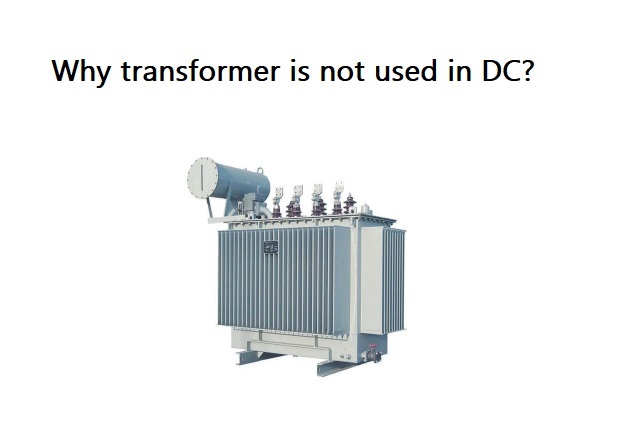Answer:
Transformers are not used in direct current (DC) systems because they rely on the principle of electromagnetic induction, which requires a changing magnetic field to induce voltage and current in the secondary winding. In a DC system, the current flows in a constant direction, creating a steady magnetic field that does not change over time. As a result, transformers are not effective in converting or transmitting DC voltage levels and are better suited for alternating current (AC) systems where the changing polarity of the voltage leads to a varying magnetic field, allowing for efficient voltage transformation and transmission.

Reasoning:
Transformers are primarily designed to work with alternating current (AC) rather than direct current (DC) due to several fundamental electrical and operational reasons. Here’s a proper reasoning for why transformers are not used in DC systems:
- Principle of Operation: Transformers operate based on the principle of electromagnetic induction. Alternating current causes continuous changes in the magnetic field, inducing voltage across the transformer’s primary and secondary windings. In contrast, direct current produces a constant magnetic field, which doesn’t cause the necessary changes in magnetic flux to induce voltage in the secondary winding. As a result, the basic operating principle of transformers is not applicable to DC systems.
- No Flux Changes: Transformers rely on the changing magnetic flux to induce voltage in the secondary coil. With DC, there are no alternating flux variations, and therefore, there is no significant voltage induced in the secondary coil. This lack of voltage transformation significantly reduces the efficacy of transformers in DC systems.
- Inefficient Magnetic Coupling: Transformers depend on magnetic coupling between coils to efficiently transfer energy. However, due to the constant magnetic field in DC systems, the magnetic coupling is less efficient, resulting in reduced energy transfer and increased losses.
- Core Saturation Issues: Transformers utilize a core made of magnetic materials to enhance the magnetic coupling between primary and secondary coils. In DC systems, the core could become magnetically saturated due to the continuous application of a constant magnetic field, which can lead to core overheating and efficiency loss.
- Electromagnetic Interference: Transformers can produce electromagnetic interference (EMI) due to the rapid changes in magnetic fields associated with AC. In DC systems, the absence of these rapid changes reduces the potential for EMI, which is often considered an advantage of DC systems in certain applications.
- Efficiency Considerations: Transformers are designed to operate efficiently in specific frequency ranges, typically within the power frequency used in AC systems. When operated outside these frequencies, their efficiency can drop significantly. Since DC systems do not involve frequency changes, it would be challenging to optimize transformer performance for DC operation.
- Cost and Complexity: Designing transformers for DC operation would require modifications to their core materials, winding arrangements, and insulation systems to address the unique challenges posed by DC. These modifications could increase the cost and complexity of transformers, making them less practical for DC applications.
The inherent characteristics of transformers, such as their reliance on changing magnetic flux and efficient magnetic coupling, make them unsuitable for use in direct current systems. While certain devices like chokes and inductors can perform similar functions in DC systems, transformers are not commonly used due to the technical challenges and inefficiencies associated with their operation in such environments.
FAQs
Can transformers be used to convert DC to AC?
Transformers are designed for AC voltage conversion and cannot directly convert DC to AC due to the absence of changing magnetic flux in DC systems.
Are there alternatives to transformers for voltage conversion in DC systems?
Yes, devices like chokes, inductors, and voltage regulators serve similar functions in managing DC power flow and providing voltage conversion and control.
Why are transformers more efficient in AC systems?
Transformers rely on changing magnetic fields in AC systems to induce voltage in secondary windings. The absence of such changing flux in DC systems reduces efficiency and increases losses.
Can transformers work with pulsed or intermittent DC currents?
Transformers still face limitations with pulsed or intermittent DC currents due to their requirement for changing magnetic flux. Pulse transformers are better suited for such applications.
Have transformers been used with DC systems historically?
Early attempts to use transformers with DC systems encountered challenges like core saturation and efficiency losses, leading to the dominance of AC systems for transformer applications.
Are there specialized transformers for DC systems?
DC-DC converters, often referred to as “DC transformers,” utilize electronic components to mimic voltage transformation and isolation functions for DC systems.
 Electrical Engineering World Wiring a Brighter Tomorrow!
Electrical Engineering World Wiring a Brighter Tomorrow!